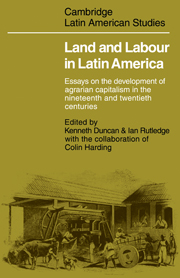 Land and Labour in Latin America
Land and Labour in Latin America Published online by Cambridge University Press: 07 May 2010
The problems of the transition from one social formation (or mode of production) to another have not yet been seriously tackled. A few attempts have been made to give them some systematic formulation, but they are on too high a level of abstraction to be of much use as guides to empirical research. As far as the concrete evidence available on the passage of traditional societies to capitalism is concerned, for example, it often comes from analyses carried out from a perspective which is too narrowly evolutionist to make generalizations possible. The authors responsible for these studies seem to agree, for the most part, that, as capitalism is a higher social formation, traditional societies are inevitably condemned to break up on contact with it and fall in a passive and mechanistic way, into the moulds established by it. Hence, no doubt, the importance given to the phenomena of destruction and deculturation which arise from these relations, which are certainly real enough, but which cannot be taken as a general rule.
Latin America is a particularly rich field for the study of the many responses which traditional societies of a colonial and seigneurial nature can make to capitalism, which has historically been built up on a broadly agrarian base. These responses from time to time result in some sort of provisional compromise, but they sometimes also result in long-lasting adjustments by which the two social formations come to articulate and consolidate themselves over a period of time, without consequently having to modify their structures.
To save this book to your Kindle, first ensure [email protected] is added to your Approved Personal Document E-mail List under your Personal Document Settings on the Manage Your Content and Devices page of your Amazon account. Then enter the ‘name’ part of your Kindle email address below. Find out more about saving to your Kindle.
Note you can select to save to either the @free.kindle.com or @kindle.com variations. ‘@free.kindle.com’ emails are free but can only be saved to your device when it is connected to wi-fi. ‘@kindle.com’ emails can be delivered even when you are not connected to wi-fi, but note that service fees apply.
Find out more about the Kindle Personal Document Service.
To save content items to your account, please confirm that you agree to abide by our usage policies. If this is the first time you use this feature, you will be asked to authorise Cambridge Core to connect with your account. Find out more about saving content to Dropbox.
To save content items to your account, please confirm that you agree to abide by our usage policies. If this is the first time you use this feature, you will be asked to authorise Cambridge Core to connect with your account. Find out more about saving content to Google Drive.